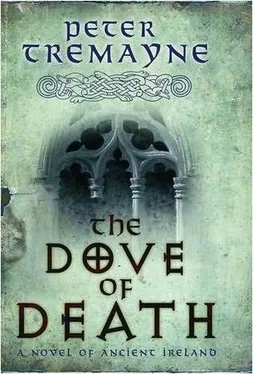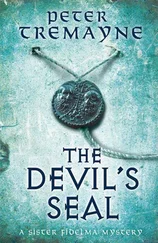Peter Tremayne - The Dove of Death
Здесь есть возможность читать онлайн «Peter Tremayne - The Dove of Death» весь текст электронной книги совершенно бесплатно (целиком полную версию без сокращений). В некоторых случаях можно слушать аудио, скачать через торрент в формате fb2 и присутствует краткое содержание. Жанр: Исторический детектив, на английском языке. Описание произведения, (предисловие) а так же отзывы посетителей доступны на портале библиотеки ЛибКат.
- Название:The Dove of Death
- Автор:
- Жанр:
- Год:неизвестен
- ISBN:нет данных
- Рейтинг книги:5 / 5. Голосов: 1
-
Избранное:Добавить в избранное
- Отзывы:
-
Ваша оценка:
- 100
- 1
- 2
- 3
- 4
- 5
The Dove of Death: краткое содержание, описание и аннотация
Предлагаем к чтению аннотацию, описание, краткое содержание или предисловие (зависит от того, что написал сам автор книги «The Dove of Death»). Если вы не нашли необходимую информацию о книге — напишите в комментариях, мы постараемся отыскать её.
The Dove of Death — читать онлайн бесплатно полную книгу (весь текст) целиком
Ниже представлен текст книги, разбитый по страницам. Система сохранения места последней прочитанной страницы, позволяет с удобством читать онлайн бесплатно книгу «The Dove of Death», без необходимости каждый раз заново искать на чём Вы остановились. Поставьте закладку, и сможете в любой момент перейти на страницу, на которой закончили чтение.
Интервал:
Закладка:
He knew that until the winds abated, they would be forced to remain on this island. He also knew that his wife would not be pleased.
Chapter Three
Fidelma looked out across the bay for the hundredth time since she had awoken. As Eadulf had predicted, her mood was not of the best at her confinement by the weather. Brother Metellus had called by after first light, but merely to confirm that they would not be able to sail until the weather lifted. As morning proceeded, it became clear that they would be unable to leave the island that day.
Their own clothing had been washed, dried and even mended where it had been torn during their escape and rescue. While Fidelma had managed to retain her ciorbholg , her comb bag carried by all women of her country, because it was attached to her girdle, a lot of the contents were missing. She had no mirror, the soap was ruined although the phal of a fragrance made from honeysuckle which she preferred to use, was intact. One of her emerald ear-clips was also missing, lost in the sea, as was her favourite gold-leaf brooch. Her marsupium, which contained many travelling items and coinage to purchase food and passage, had been in the cabin of the Barnacle Goose . As for Eadulf, he had rushed on deck when the attack began, straight from his bunk, with only his clothes. The pair of them were destitute and at the sufferance of strangers. However, they did not discuss the matter for, at the moment, there was no prospect of resolving the problem.
Fidelma, being an active person, had announced her intention of exploring the island to pass the time. Brother Metellus had offered to show them the points of interest. Yet by midday, buffeted by the winds, they had already exhausted such sights as there were to be seen. The island was so low-lying that Fidelma could imagine a single large wave engulfing it. The main habitations and harbour had been built around a wide bay. It was a spot called Argol — the place of danger — a name Eadulf thought odd for a harbour. The rest of the island was one of wild heath; the dunes, especially to the east, were covered with small yellow flowers emerging from spiky silver-green leaf foliage that had a distinct and pungent fragrance. Eadulf recognised this plant as the curious addition to the salad dishes served the previous evening. Among the dunes, there were also wild carnations and sand lilies. Fidelma, so used to great mountains, broad rivers and fertile plains, wondered aloud why anyone would settle in such a dull place. Then she apologised to Brother Metellus for questioning his choice of home.
‘If the truth be known, it was not my choice,’ he replied gravely. ‘It is a long story.’
‘We appear to have time on our hands,’ Fidelma said with dry humour.
‘Very well, I shall explain. When I felt the call to join the religious,’ began Brother Metellus, ‘I left my family on the slopes of Mount Sabatini, which is north of Rome, and joined the community at Subiaco, where Benedict, patriarch of all the monks of the western world, first settled away from the vices of Rome. He was a man of peace and moderation, albeit singular in purpose in teaching the truth of the Faith.’
‘From Subiaco to here is quite a journey,’ Eadulf interrupted.
‘I grant you, it is a very long journey. I was five years studying in Subiaco before accepting the mission to bring the Rule of Benedict to the west, where I was told that the people had strange rituals and philosophies that were in conflict with those of Rome.’
‘And you came here to enlighten us?’ Fidelma’s tone was ironical.
‘I have spent ten years now in this land called Bro-Waroch, among the Bretons. I have succeeded in teaching little, I am afraid,’ admitted Brother Metellus.
‘But why come here, on this tiny island?’ pressed Fidelma.
‘I wandered the countryside, teaching and learning the language of the Bretons and the Franks. But a year ago I went to serve in the abbey of the Blessed Gildas. At first, all was well, for the Abbot Maelcar said he supported the Rule of Benedict. Then I dared question an interpretation of scripture and the Abbot suggested that I come to serve the isolated community here to reflect and learn humbleness.’
Fidelma’s eyes narrowed a fraction. ‘Why would you need to reflect and be humble, for questioning an interpretation of scripture?’
‘For questioning the interpretation of Abbot Maelcar,’ corrected Brother Metellus. ‘He is old-fashioned, the son of a noble family from the Brekilien Forest.’
‘I would venture that it was the Abbot who needed to learn humility,’ she commented. ‘One learns by asking questions, and both the questioner and the questioned can profit by the exchange.’
‘That is not how the Abbot thinks. Anyway, it is a pleasant enough place to be…for a while.’ Brother Metellus turned and pointed. ‘We have reminders, too, that people have been living here from the time beyond time.’
They found themselves staring at a strange standing stone, a tall menhir that stood almost three times Fidelma’s height.
‘Local people call it the Virgin’s Menhir, and a little way from here is a large cairn which marks the last resting-place of an important chieftain who died long before the Romans came to these lands. The islanders tell great tales of this champion.’
But even with these fascinating sights and stories, it was not long before the couple realised they had traversed the complete island and seen everything.
Fidelma was confirmed in her frustration that she was a prisoner on this small rock of an island. However, the keening wind, the gusting little white billows on the sea, with the heavy grey clouds and a mist that seemed to hang like a shroud above the waters, were evidence that there was nothing else to do. So they walked slowly back to the shelter of the homesteads.
A few people were outside tending the small patches where fruit and vegetables grew, but not many. Most people were inside, for this was a fishing community and in such weather, no one could put out to sea. The boats were bobbing up and down, tied together, in the comparative shelter of the harbour.
Fidelma looked longingly towards the shrouded mainland.
‘So who was this founder of the abbey to which you belong?’ asked Eadulf of Brother Metellus by way of distraction.
‘Gildas was his name. He was one of the Britons who fled from the Saxon invasions of his land, as did many of the ancestors of these people here,’ replied Brother Metellus.
‘I am aware that the ancestors of my people are but recently settled on that island,’ Eadulf acknowledged.
‘Let us go out of the wind and have a cider to keep the chill at bay,’ Brother Metellus suggested tactfully.
Seated before the smouldering fire inside of Brother Metellus’ cabin, with cider to drink, Eadulf prompted him: ‘You were telling us of this man Gildas who founded the abbey you served in.’
‘His story is set against the settlement of your ancestors on the island of Britain, and I would not wish to say anything you might take amiss,’ Brother Metellus replied frankly.
‘How can one take history amiss, unless it is contrary to truth?’ queried Eadulf. ‘You are a Roman. Surely, in your wandering through the lands that were once conquered and ruled by Roman armies, you have met with all sorts of stories. You will know that to shut your ears to people’s views of the history of your ancestors is to blind yourself to truth and progress.’
Often, Fidelma reflected to herself, Eadulf would surprise her by his deep insight into the nature of people. She glanced at Brother Metellus. ‘Tell us about this Gildas,’ she invited. ‘I think I might know of the man.’
Brother Metellus sat back, taking a sip of his drink first.
Читать дальшеИнтервал:
Закладка:
Похожие книги на «The Dove of Death»
Представляем Вашему вниманию похожие книги на «The Dove of Death» списком для выбора. Мы отобрали схожую по названию и смыслу литературу в надежде предоставить читателям больше вариантов отыскать новые, интересные, ещё непрочитанные произведения.
Обсуждение, отзывы о книге «The Dove of Death» и просто собственные мнения читателей. Оставьте ваши комментарии, напишите, что Вы думаете о произведении, его смысле или главных героях. Укажите что конкретно понравилось, а что нет, и почему Вы так считаете.











